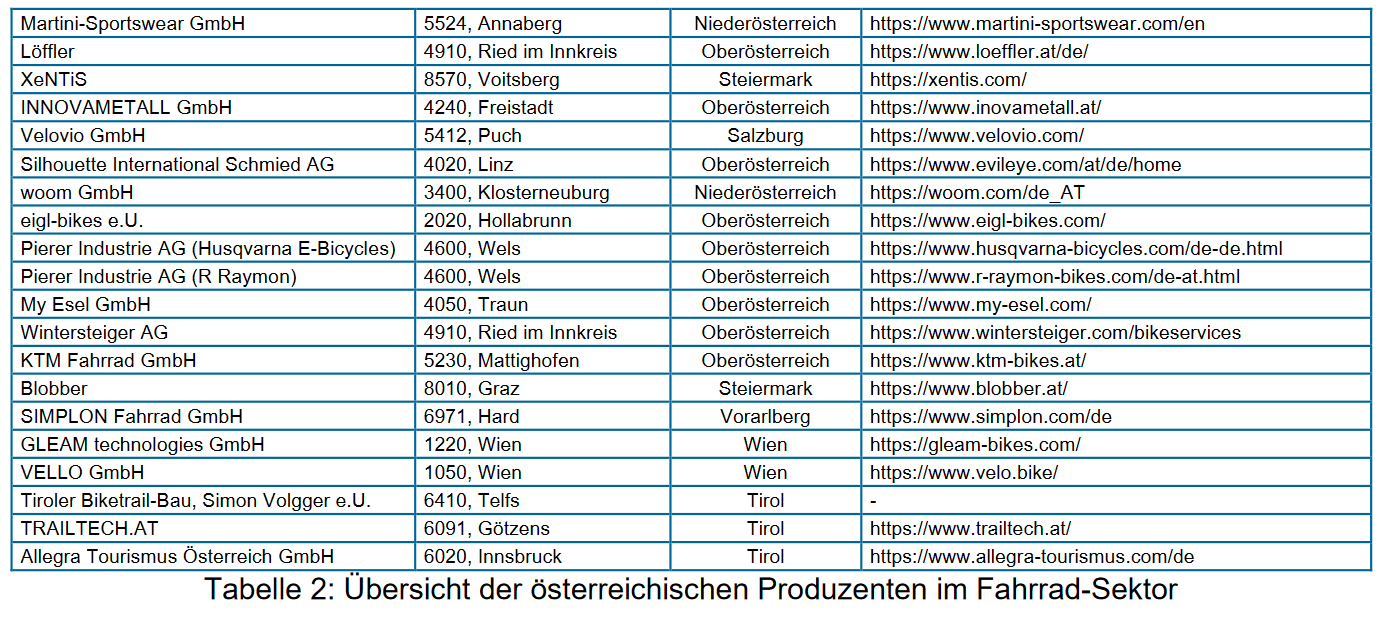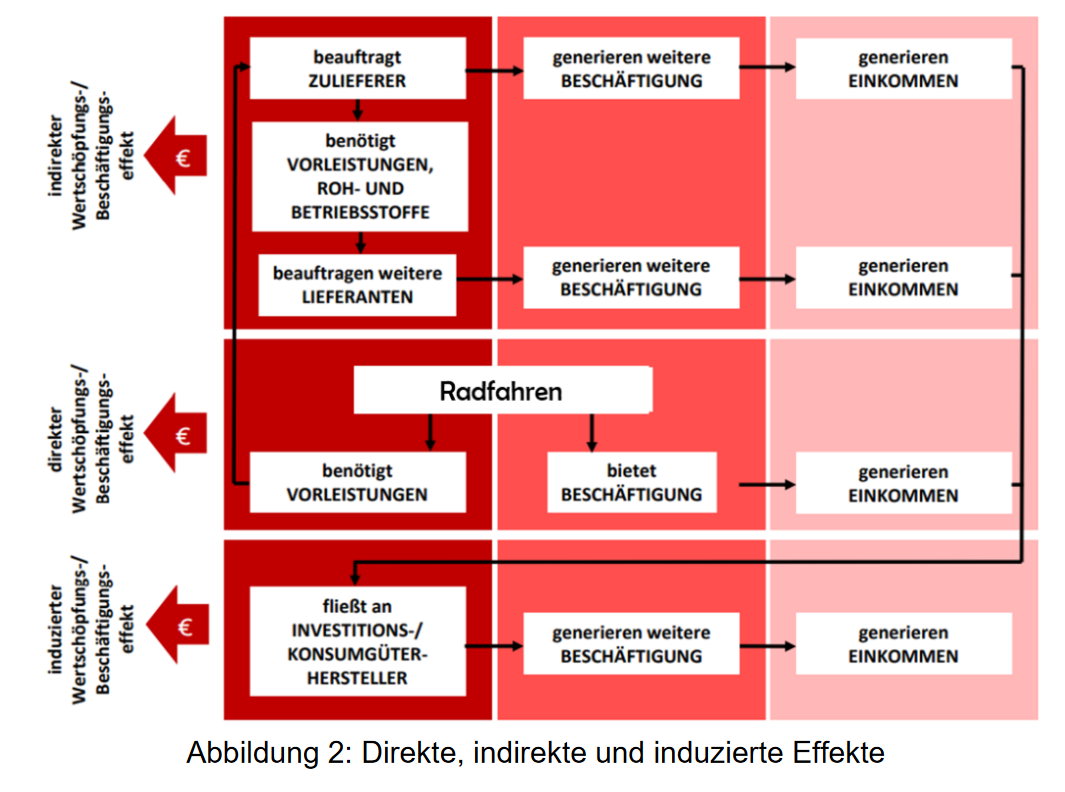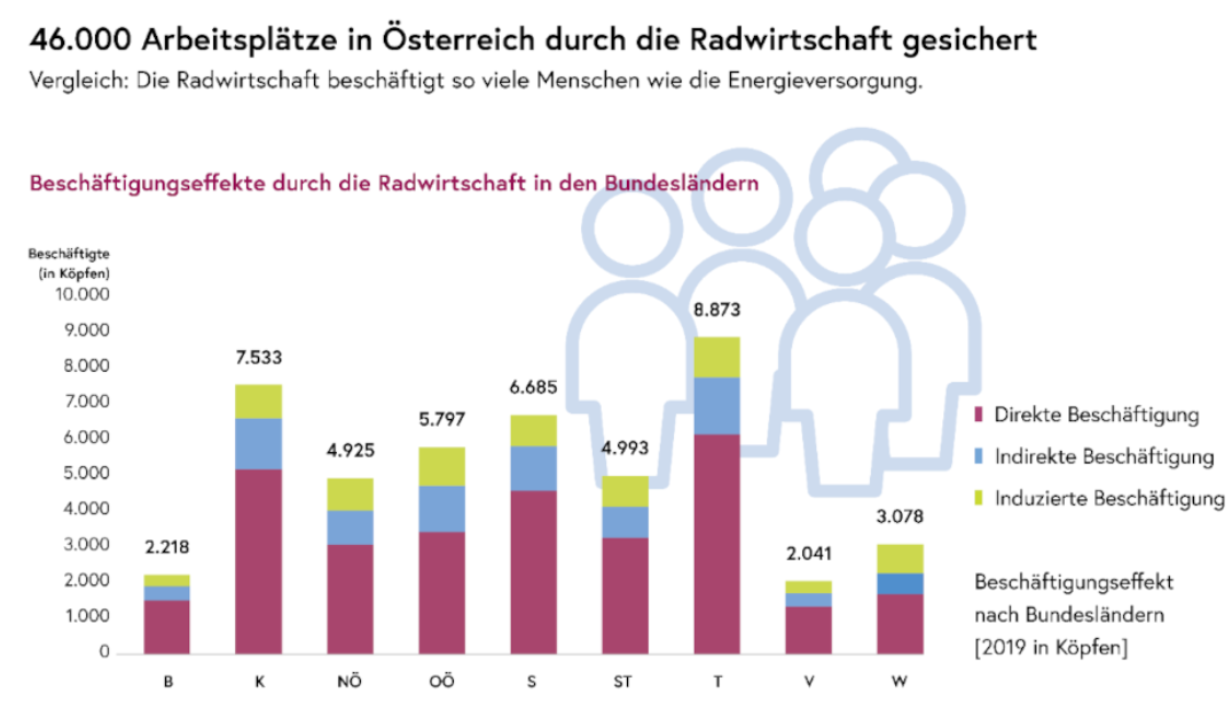Economic Factors of Cycling: 46,000 Jobs in Austria
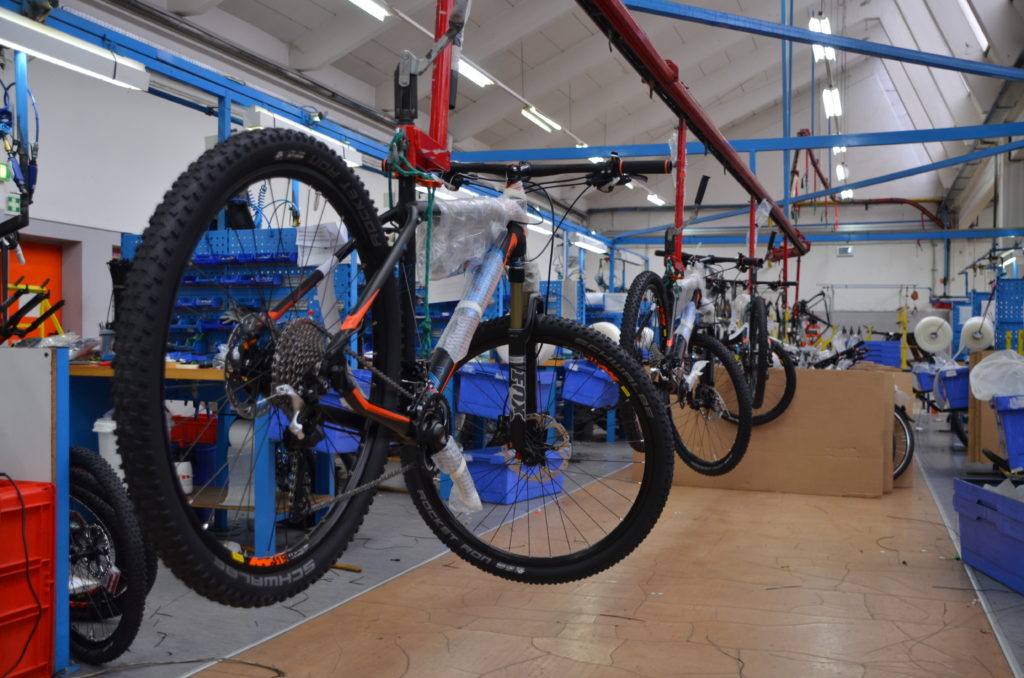
An updated study analysing the economic effects of cycling has demonstrated the many positive consequences of cycling in a set of concrete facts and figures. Cycling creates 46,000 jobs and contributes 2.9 billion Euros to the Austrian economy. In fact, the authors of the study discovered that the bicycle industry contributes more economically than the entire Austrian paper industry, and that the direct effects are even bigger than the road construction sector, highlighting the fact that, until now, the economic importance of the bicycle sector has been continually underestimated.
The economic effects of cycling are made up of a colourful web of beneficial factors which include commercial factors such as the production and sales of bicycles, bicycle infrastructure but also bicycle tourism and many non-commercial activities and events organised by bicycle clubs and groups of enthusiasts.
As early as 2009, a small study which analysed cycling using social and economic parameters in 6 modules showed that the direct and indirect effects of cycling provided value of 882.5 million Euros and created the equivalent of 18,328 full-time jobs in the industry.
Cycling’s value-creation has more than doubled since 2009
The current study shows that the direct and indirect gross economic value created by cycling has more than doubled to 2.6 billion Euros since 2009. In 2019, the total gross economic value, taking into account both the direct and indirect contributions as well as value created by cycling further down the value-chain, was in fact as high as 2.9 billion Euros.
Overview of Austria’s Bike Manufacturers
When a comparison is made of the total economic effects of certain sectors, it can be concluded that cycling is roughly the size of the telecommunications industry, and bigger than sectors such as the paper industry and that of road construction. Furthermore, for every Euro of value created by the cycling industry, 64 cents is created as a direct result in other economic sectors. When assessed on a regional basis, the largest economic effects are seen in Tirol (580.6 million Euros) and in Carinthia (503.4 million Euros). These two regions together produce around a third of Austria’s gross added value.
As a cross-sectional economic force, cycling has for a long time been underestimated, according to the authors of the study who were commissioned by the Ministry for Climate Protection (BMK): “If one were to use the traditionally understood definition of economic value normally used in statistical evaluation, only the production, commercial sale of bikes and bike rental would be included in the economic factors of the sector. These branches of the bike industry produce a combined economic value of 1150 million Euros. If we widen the net to include all aspects of life to which bikes add value, taking into account its usage both as a sporting tool and a means of transport, there would be a total of 21 sectors, the turnover of which is 3.7 billion Euros. This alone demonstrates that the contribution of cycling has been underestimated by at least a factor of 3”.
Every 100th place of work is dependent on the bicycle
The bicycle industry plays an above average role in Austrian employment: 1.03% of workplaces in Austria are in some way dependent on the bicycle industry. As of 2019, the number of people employed in the bicycle industry is 46,143 and as compared to 2009, the equivalent number of full-time employees has doubled to 35,463. Two thirds of those directly employed in the bicycle industry are in the tourism sector (hotel and gastronomy sector as well as non-motor vehicle commerce). The number of people employed in the bicycle sector is thus roughly the same size as that of the Austrian energy sector.
Yearly bike sales return to levels not seen since 2009
The sales of new bicycles has seen strong growth in the last few years. The main factor in this trend is the growing popularity of pedelec electrically supported bicycles, the market share of which was 41% in 2020. The increase in demand is also having a large effect on production and supply chains as well as increasing the price of the end product. The cost of a new bike in 2020 is more than double what it was in 2015, rising from €780 to €1,769. The sales of cargo bikes has also seen strong growth, more than 3000 of which, both motorised and non-motorised, were subsidised by the Ministry for Climate Protection (BMK). Cargo bikes are increasingly being seen as a serious alternative to fossil fuel burning vehicles, especially in urban settings.
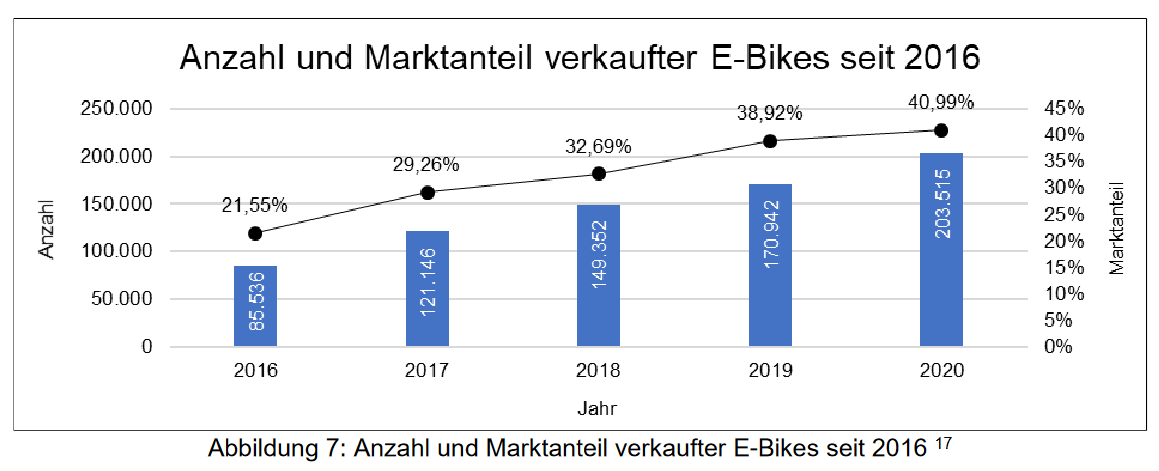
Amount and Market Share of E-Bikes since 2016
Only in 2020 have we seen the level of bike sales return to levels comparable to those of 2009 however. This is due to the fact that in the past decade, the population has grown from around 8.3 to 8.8 million people, and with it cycling’s target audience, while the total number of bikes sold fell slightly.
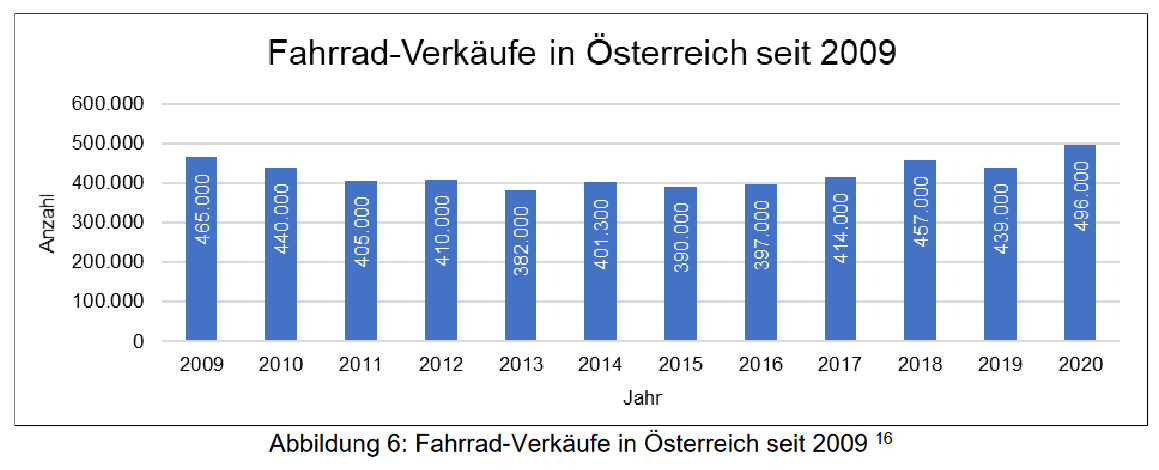 Bicycle Sales in Austria since 2009
Bicycle Sales in Austria since 2009
Growing Bicycle Tourism and New Fields of Work
As a whole, the economic value contributed by bicycle tourism has trebled as compared to the 2009 study and the number of people employed in the sector has almost doubled. Bike and mountain bike tourism and short get-aways by bike now show much greater potential to provide low impact and climate friendly foreign tourism options. The new bicycle mechatronic apprenticeship is also helping to professionalise the sector. Overall, the study has shown “that every 123rd Euro of Austria’s economy can be either directly or somewhat directly linked to Austria’s bicycle sector”.
In fact, other industries can add even more to the results shown. For example, engineering firms were not able to be explicitly evaluated and included in the study in terms of their value contribution to the bicycle sector. “Due to the fact that their remit usually falls within the realms of civil engineering, their specific effect on the planning and implementation of cycle infrastructure was not taken into account in the study”. And although their areas of research connected to cycle-related infrastructure was recognised, “the particularities could not be accurately identified and quantified, meaning that these were unable to be included”. The inclusion of marketing and communication elements in the study was also limited to the campaigns ‘Austria Cycles’ in the category of everyday cycling/commuting and ‘I like it bike it’ in the tourism sector.
Download the full study here. Prepared by the Technical University of Vienna: research focus traffic planning and technology, Econmove GmbH, Condor GmbH, University of Natural Resources and Life Sciences Vienna, Institute for Transportation.
Cycling Competence Members in this article:
More articles with this member:
Share this article:
Economic Factors of Cycling: 46,000 Jobs in Austria
Share this article:

An updated study analysing the economic effects of cycling has demonstrated the many positive consequences of cycling in a set of concrete facts and figures. Cycling creates 46,000 jobs and contributes 2.9 billion Euros to the Austrian economy. In fact, the authors of the study discovered that the bicycle industry contributes more economically than the entire Austrian paper industry, and that the direct effects are even bigger than the road construction sector, highlighting the fact that, until now, the economic importance of the bicycle sector has been continually underestimated.
The economic effects of cycling are made up of a colourful web of beneficial factors which include commercial factors such as the production and sales of bicycles, bicycle infrastructure but also bicycle tourism and many non-commercial activities and events organised by bicycle clubs and groups of enthusiasts.
As early as 2009, a small study which analysed cycling using social and economic parameters in 6 modules showed that the direct and indirect effects of cycling provided value of 882.5 million Euros and created the equivalent of 18,328 full-time jobs in the industry.
Cycling’s value-creation has more than doubled since 2009
The current study shows that the direct and indirect gross economic value created by cycling has more than doubled to 2.6 billion Euros since 2009. In 2019, the total gross economic value, taking into account both the direct and indirect contributions as well as value created by cycling further down the value-chain, was in fact as high as 2.9 billion Euros.
Overview of Austria’s Bike Manufacturers
When a comparison is made of the total economic effects of certain sectors, it can be concluded that cycling is roughly the size of the telecommunications industry, and bigger than sectors such as the paper industry and that of road construction. Furthermore, for every Euro of value created by the cycling industry, 64 cents is created as a direct result in other economic sectors. When assessed on a regional basis, the largest economic effects are seen in Tirol (580.6 million Euros) and in Carinthia (503.4 million Euros). These two regions together produce around a third of Austria’s gross added value.
As a cross-sectional economic force, cycling has for a long time been underestimated, according to the authors of the study who were commissioned by the Ministry for Climate Protection (BMK): “If one were to use the traditionally understood definition of economic value normally used in statistical evaluation, only the production, commercial sale of bikes and bike rental would be included in the economic factors of the sector. These branches of the bike industry produce a combined economic value of 1150 million Euros. If we widen the net to include all aspects of life to which bikes add value, taking into account its usage both as a sporting tool and a means of transport, there would be a total of 21 sectors, the turnover of which is 3.7 billion Euros. This alone demonstrates that the contribution of cycling has been underestimated by at least a factor of 3”.
Every 100th place of work is dependent on the bicycle
The bicycle industry plays an above average role in Austrian employment: 1.03% of workplaces in Austria are in some way dependent on the bicycle industry. As of 2019, the number of people employed in the bicycle industry is 46,143 and as compared to 2009, the equivalent number of full-time employees has doubled to 35,463. Two thirds of those directly employed in the bicycle industry are in the tourism sector (hotel and gastronomy sector as well as non-motor vehicle commerce). The number of people employed in the bicycle sector is thus roughly the same size as that of the Austrian energy sector.
Yearly bike sales return to levels not seen since 2009
The sales of new bicycles has seen strong growth in the last few years. The main factor in this trend is the growing popularity of pedelec electrically supported bicycles, the market share of which was 41% in 2020. The increase in demand is also having a large effect on production and supply chains as well as increasing the price of the end product. The cost of a new bike in 2020 is more than double what it was in 2015, rising from €780 to €1,769. The sales of cargo bikes has also seen strong growth, more than 3000 of which, both motorised and non-motorised, were subsidised by the Ministry for Climate Protection (BMK). Cargo bikes are increasingly being seen as a serious alternative to fossil fuel burning vehicles, especially in urban settings.

Amount and Market Share of E-Bikes since 2016
Only in 2020 have we seen the level of bike sales return to levels comparable to those of 2009 however. This is due to the fact that in the past decade, the population has grown from around 8.3 to 8.8 million people, and with it cycling’s target audience, while the total number of bikes sold fell slightly.
 Bicycle Sales in Austria since 2009
Bicycle Sales in Austria since 2009
Growing Bicycle Tourism and New Fields of Work
As a whole, the economic value contributed by bicycle tourism has trebled as compared to the 2009 study and the number of people employed in the sector has almost doubled. Bike and mountain bike tourism and short get-aways by bike now show much greater potential to provide low impact and climate friendly foreign tourism options. The new bicycle mechatronic apprenticeship is also helping to professionalise the sector. Overall, the study has shown “that every 123rd Euro of Austria’s economy can be either directly or somewhat directly linked to Austria’s bicycle sector”.
In fact, other industries can add even more to the results shown. For example, engineering firms were not able to be explicitly evaluated and included in the study in terms of their value contribution to the bicycle sector. “Due to the fact that their remit usually falls within the realms of civil engineering, their specific effect on the planning and implementation of cycle infrastructure was not taken into account in the study”. And although their areas of research connected to cycle-related infrastructure was recognised, “the particularities could not be accurately identified and quantified, meaning that these were unable to be included”. The inclusion of marketing and communication elements in the study was also limited to the campaigns ‘Austria Cycles’ in the category of everyday cycling/commuting and ‘I like it bike it’ in the tourism sector.
Download the full study here. Prepared by the Technical University of Vienna: research focus traffic planning and technology, Econmove GmbH, Condor GmbH, University of Natural Resources and Life Sciences Vienna, Institute for Transportation.

